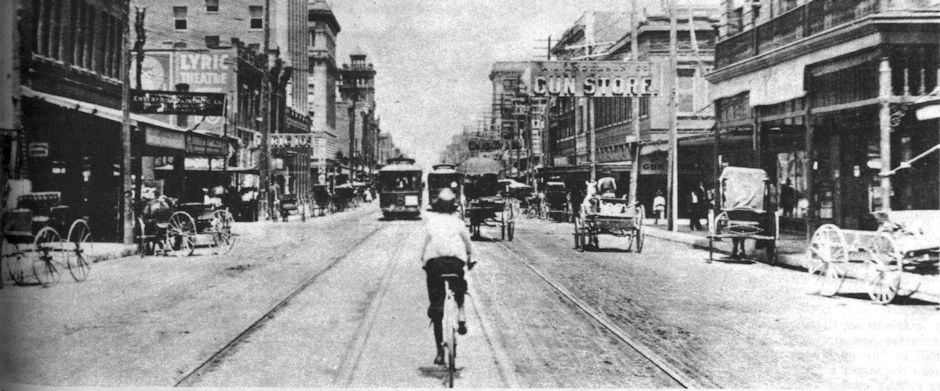Part 1 detailed the Boyce-Sneed feud, which began in 1912 in the lobby of the Metropolitan Hotel after two men got crossways with each other over a woman.
Fast-forward twenty years. Part 3 details the Phillips-Churchill murder, which occurred in the lobby of the Metropolitan Hotel in 1932 after two men got crossways with each over . . . wait for it . . . a woman.
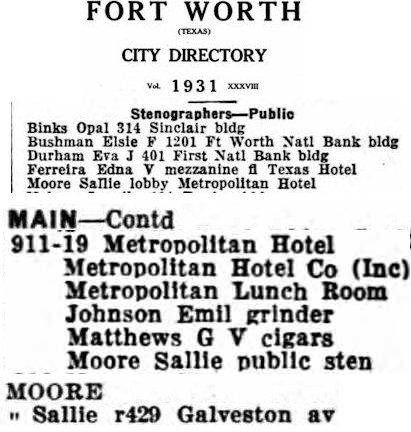 Specifically, Sallie Moore, a stenographer.
Specifically, Sallie Moore, a stenographer.
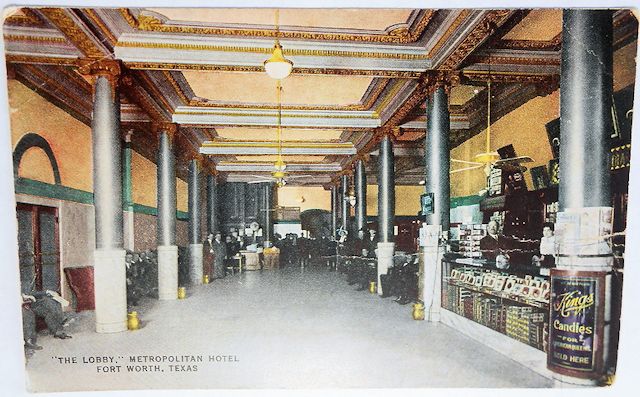 Sallie worked in the lobby of the Metropolitan.
Sallie worked in the lobby of the Metropolitan.
When her workday was over, and Sallie put down her pad and pencil, she had been stepping out with Whitmore Stonewall “Stony” Phillips, thirty-nine, of Travis Avenue. But early in 1932 Phillips left town.
Sally transferred her affections to Elmer Leland Churchill, forty-six, an oilfield drilling contractor who had lived in the Metropolitan Hotel eight years.
When Phillips got word of this transferal of affections, he returned to Fort Worth. At 5 p.m. on March 14, 1932 Phillips confronted Churchill in the lobby of the Metropolitan and shot him four times.
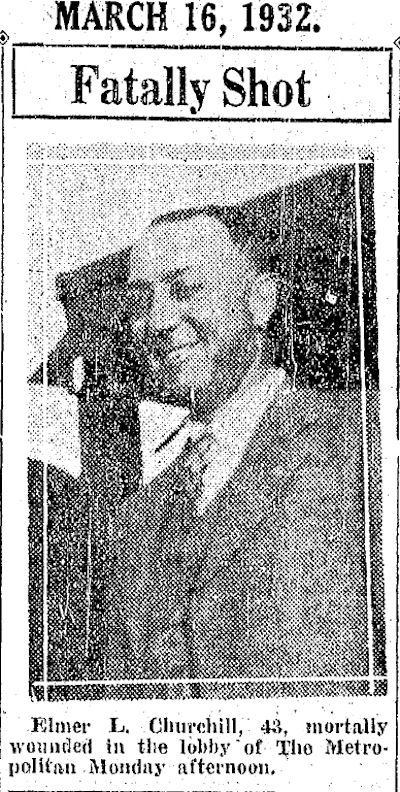 Before Churchill died, he told police that he and Phillips had argued over a woman. Churchill said he knew his assailant only casually, had encountered him in the lobby earlier on March 14 when Churchill was in the company of a woman whom Churchill would not name.
Before Churchill died, he told police that he and Phillips had argued over a woman. Churchill said he knew his assailant only casually, had encountered him in the lobby earlier on March 14 when Churchill was in the company of a woman whom Churchill would not name.
“He cursed me and the woman,” Churchill said, “and I told him to leave us alone, that I wanted no trouble with him. He left, and I didn’t see him again until almost the time of the shooting.
“I was standing in the hotel lobby talking with the hotel clerk when he [Phillips] came up to where I was standing and cursed me again. I made no move to strike him, and I had no weapon in my hand or on my person. He drew a pistol and fired three or four times—I don’t remember how many.”
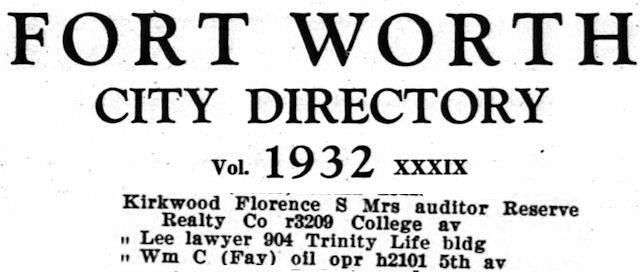 Among the witnesses was W. C. “Pappy” Kirkwood, officially an “oil operator” but unofficially a high-stakes gambler and owner of the Four Deuces casino on Jacksboro Highway.
Among the witnesses was W. C. “Pappy” Kirkwood, officially an “oil operator” but unofficially a high-stakes gambler and owner of the Four Deuces casino on Jacksboro Highway.
Kirkwood was standing in the hotel lobby when the shots were fired. He said the man with the pistol shot several times, retreated to the men’s restroom adjoining the lobby, but returned immediately and fired another shot at Churchill.
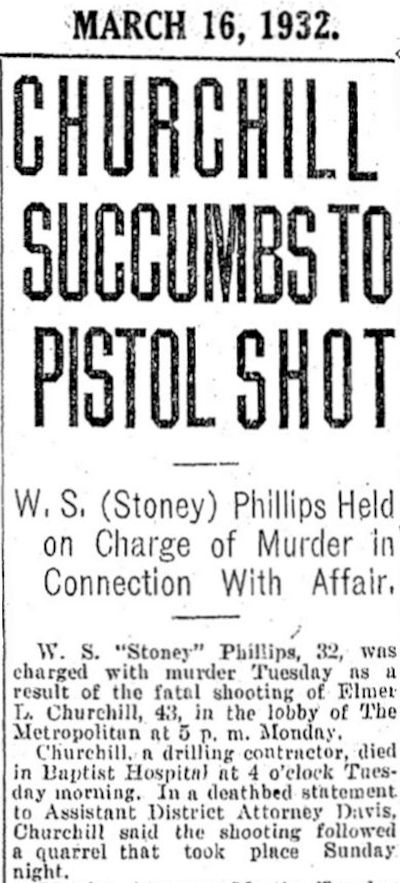 Churchill died in Baptist Hospital on March 15, and Phillips was charged with murder.
Churchill died in Baptist Hospital on March 15, and Phillips was charged with murder.
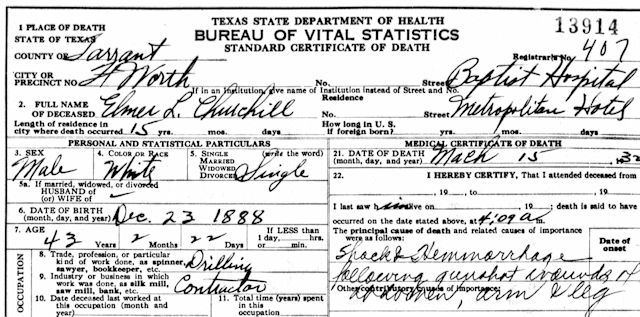
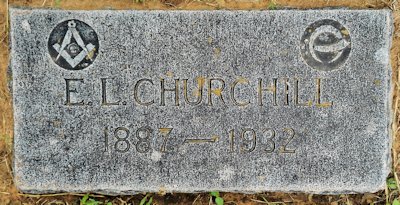
Elmer Leland Churchill is buried in Rose Hill Cemetery.
On a change of venue Phillips’s trial was moved to Breckenridge after thirty-eight defense witnesses here said they did not think Phillips could get a fair trial in Fort Worth because of his “past conduct.”
Phillips indeed was a hard case. A one-armed man, he got into more mischief than many two-armed men. (Born in 1894, he would have been twenty-three when America entered World War I. A Marine private, he may have lost his arm in the war.)
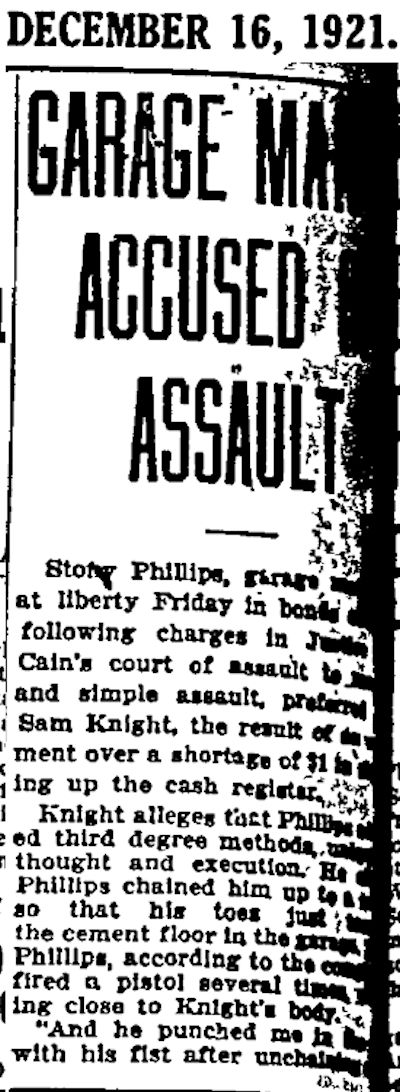 In 1921 Phillips had been charged with assault to murder after he chained employee Sam Knight to the rafters of Phillips’s Fifth Street Garage after Knight made a $1 error in checking the cash register. With Knight’s toes dangling off the floor, Phillips fired gunshots near Knight’s body, then unchained him and punched him in the eye.
In 1921 Phillips had been charged with assault to murder after he chained employee Sam Knight to the rafters of Phillips’s Fifth Street Garage after Knight made a $1 error in checking the cash register. With Knight’s toes dangling off the floor, Phillips fired gunshots near Knight’s body, then unchained him and punched him in the eye.
Phillips was charged with assault to murder another time as well.
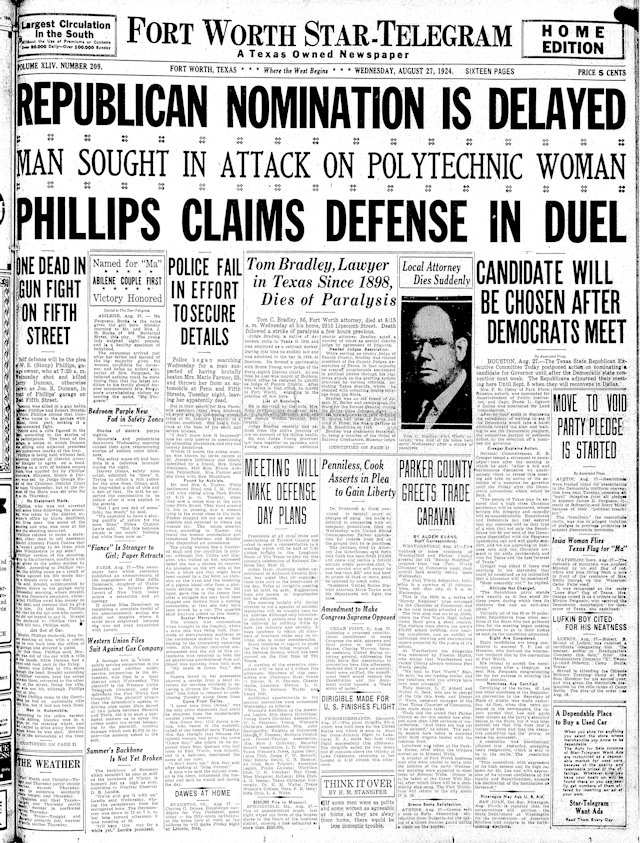 In 1924 Phillips was charged with murder after killing Harry Duncan during a three-man gunfight at Phillips’s garage after a dispute over the sale of a car. Phillips never went to trial in these three cases.
In 1924 Phillips was charged with murder after killing Harry Duncan during a three-man gunfight at Phillips’s garage after a dispute over the sale of a car. Phillips never went to trial in these three cases.
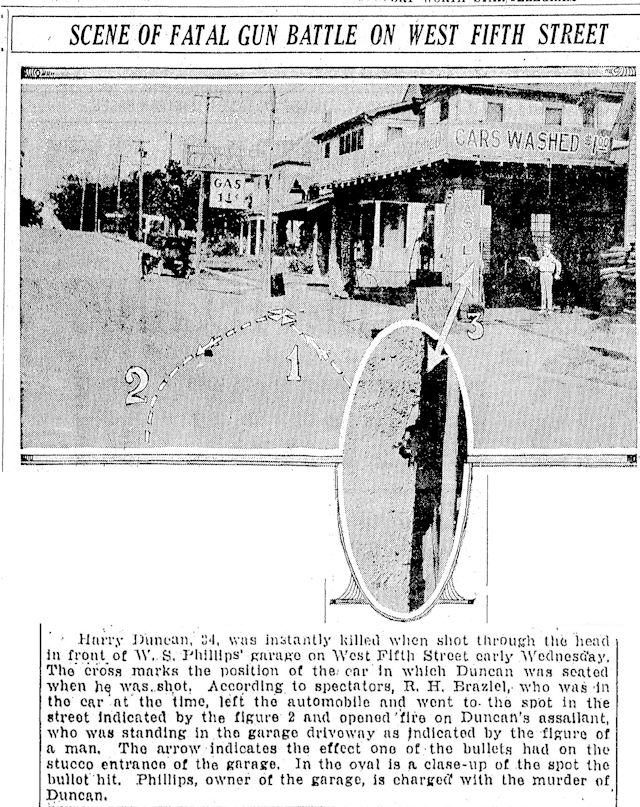 Photo details the three-cornered gunfight in which Phillips killed Duncan.
Photo details the three-cornered gunfight in which Phillips killed Duncan.
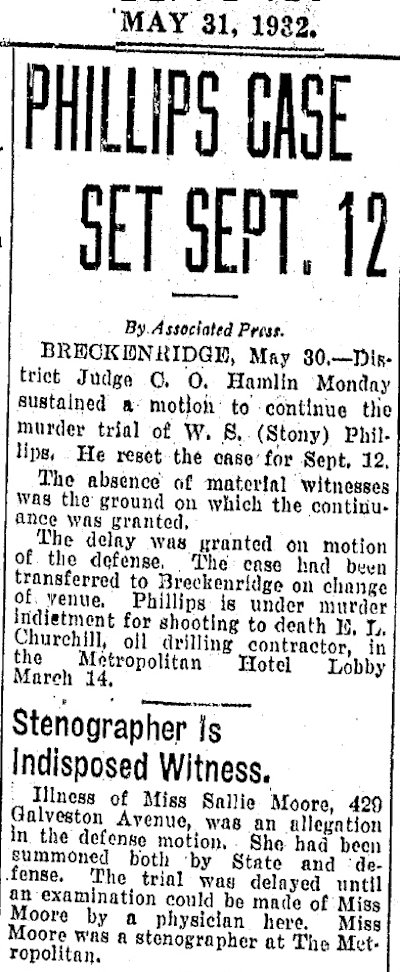 Phillips’s trial for the murder of E. L. Churchill was delayed by the illness of Sallie Moore, who was called as a witness by both the state and the defense.
Phillips’s trial for the murder of E. L. Churchill was delayed by the illness of Sallie Moore, who was called as a witness by both the state and the defense.
When Phillips went on trial in September 1932 for killing Churchill, Fort Worth pawn shop operator Jacob Klar testified that Phillips had come into his store on the day of the shooting and bought a .45-caliber automatic pistol. While in the shop Phillips started to load the pistol with six bullets he bought from Klar. Klar warned Phillips that loading the pistol was “dangerous business” and told Phillips to load the pistol outside the store. Phillips left. Klar said that thirty minutes later a man came into the shop and told Klar that Phillips had just shot a man.
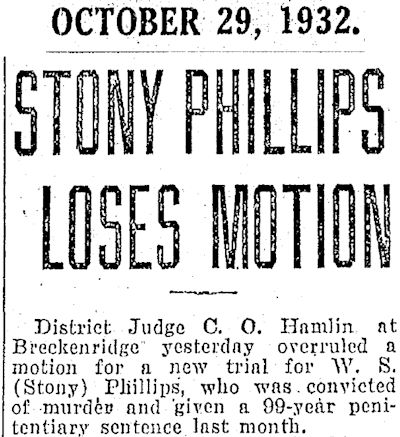 Phillips was found guilty of murder and sentenced to ninety-nine years in prison. His motion for a new trial was denied.
Phillips was found guilty of murder and sentenced to ninety-nine years in prison. His motion for a new trial was denied.
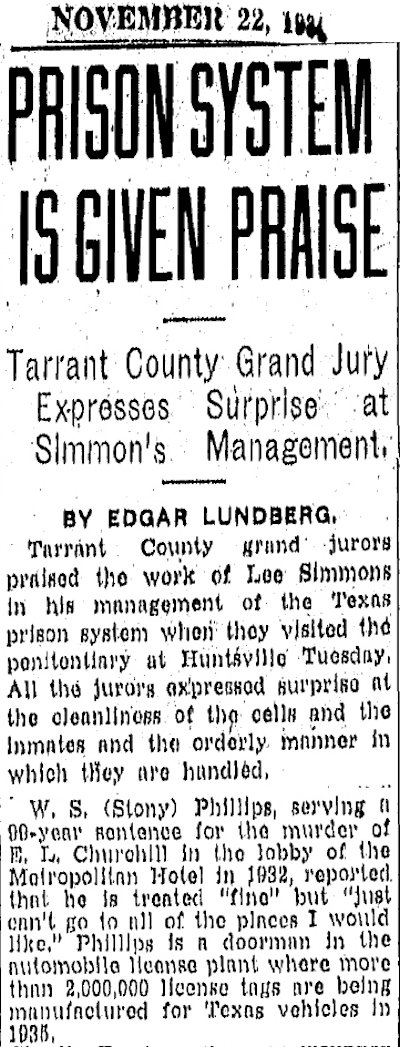 In 1934 Phillips was a doorman at Huntsville prison’s automobile license plate plant.
In 1934 Phillips was a doorman at Huntsville prison’s automobile license plate plant.
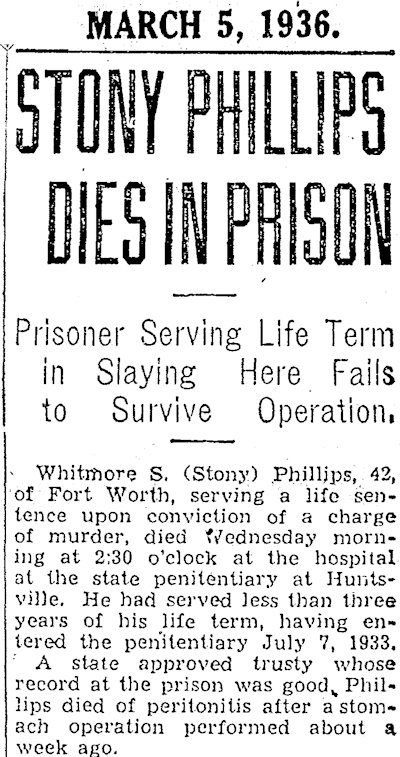
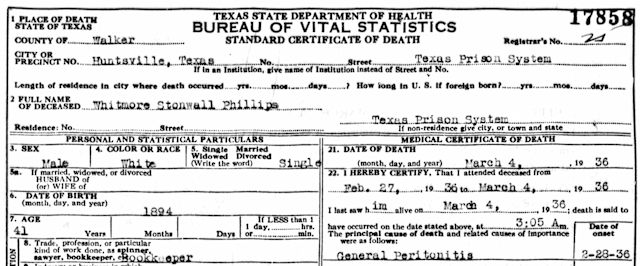 Phillips did not live to hear many license plates being stamped: He died in prison in 1936.
Phillips did not live to hear many license plates being stamped: He died in prison in 1936.
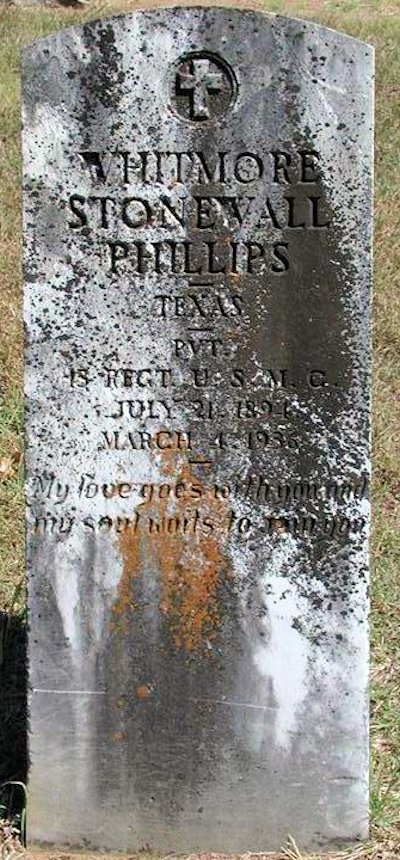 Whitmore Stonewall “Stony” Phillips is buried in Rehoboth Cemetery in Arlington.
Whitmore Stonewall “Stony” Phillips is buried in Rehoboth Cemetery in Arlington.
(Out of the seven homicides and four attempted homicides recounted in the three parts of “The Metropolitan Hotel: Mahogany and Homicide,” Phillips’s guilty verdict in the Churchill murder represents the only conviction.)
The Metropolitan Hotel: Mahogany and Homicide (Part 1)
